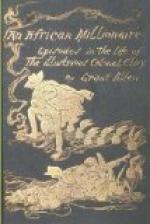“What would be his terms, do you think, for a private séance?” he asked of Madame Picardet, the lady to whom the Seer had successfully predicted the winning numbers.
“He does not work for money,” Madame Picardet answered, “but for the good of humanity. I’m sure he would gladly come and exhibit for nothing his miraculous faculties.”
“Nonsense!” Sir Charles answered. “The man must live. I’d pay him five guineas, though, to see him alone. What hotel is he stopping at?”
“The Cosmopolitan, I think,” the lady answered. “Oh no; I remember now, the Westminster.”
Sir Charles turned to me quietly. “Look here, Seymour,” he whispered. “Go round to this fellow’s place immediately after dinner, and offer him five pounds to give a private séance at once in my rooms, without mentioning who I am to him; keep the name quite quiet. Bring him back with you, too, and come straight upstairs with him, so that there may be no collusion. We’ll see just how much the fellow can tell us.”
I went as directed. I found the Seer a very remarkable and interesting person. He stood about Sir Charles’s own height, but was slimmer and straighter, with an aquiline nose, strangely piercing eyes, very large black pupils, and a finely-chiselled close-shaven face, like the bust of Antinous in our hall in Mayfair. What gave him his most characteristic touch, however, was his odd head of hair, curly and wavy like Paderewski’s, standing out in a halo round his high white forehead and his delicate profile. I could see at a glance why he succeeded so well in impressing women; he had the look of a poet, a singer, a prophet.
“I have come round,” I said, “to ask whether you will consent to give a séance at once in a friend’s rooms; and my principal wishes me to add that he is prepared to pay five pounds as the price of the entertainment.”
Señor Antonio Herrera—that was what he called himself—bowed to me with impressive Spanish politeness. His dusky olive cheeks were wrinkled with a smile of gentle contempt as he answered gravely—




